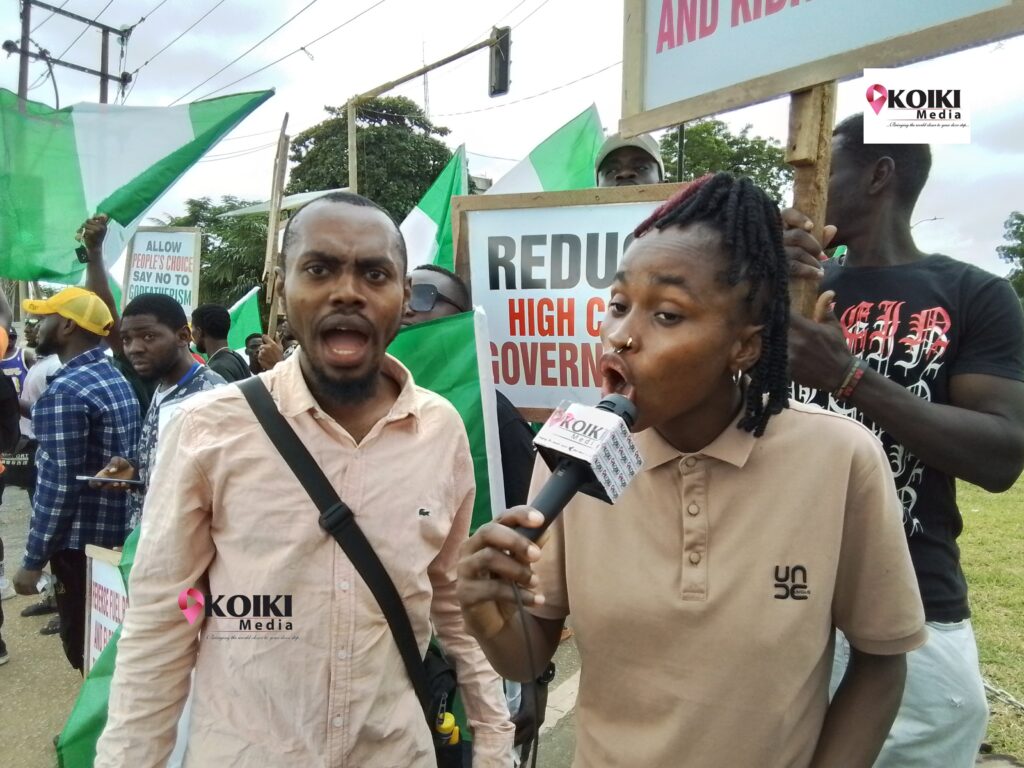
At least eleven people were killed after the police operatives deployed lethal force to quell a series of demonstrations that broke out across Nigeria on Thursday over high cost of living.
Witnesses in Kano State said the police were responsible for three deaths in the northern commercial centre, an accusation the police denied.
The police said that violent elements disrupted the protest and used the moment to loot stores and fatally stab other protesters.
Some of the protesters are seen waving the flags of Russia and Saudi Arabia. Close to the government building in Kano state.
Kano State Governor Abba Yusuf declared a 24-hours curfew in the state with immediate effect.
Yusuf told newsmen that the action became imperative to ensure full protection of lives and properties in the state as hoodlums and thugs have reportedly hijacked the protest to embark on looting and indiscriminate killing of innocent citizens.
The governor said all security agencies were directed to ensure full and immediate compliance.
The End Bad Governance protest in Katsina, Katsina state on Thursday did not end peacefully, as no fewer than thirty people were injured, one dead and fifty miscreants arrested.
Aliyu Abubakar Musa, the state Police Commissioner made known in an interview with newsmen in Katsina, but the police boss said no life was lost.
Abubakar Musa said the command was on top of the situation. He said those arrested would be profiled and thoroughly scrutinized, as anyone found culpable would face the full wrath of the law.
According to local news outlet, Daily Trust, security operatives who felt threatened after being outnumbered by protesters opened fire in order to disperse the crowd in Suleja, a city in Niger State, just north of Abuja, the country’s capital, killing six and wounding some others. The protesters had barricaded a section of the Abuja-Kaduna highway.
Residents in Borno State said at least two people were killed during today’s protests in Maiduguri, the capital of the northern state.
Another report said four persons were killed, a viral video showed four males lying in the pool of their own blood.
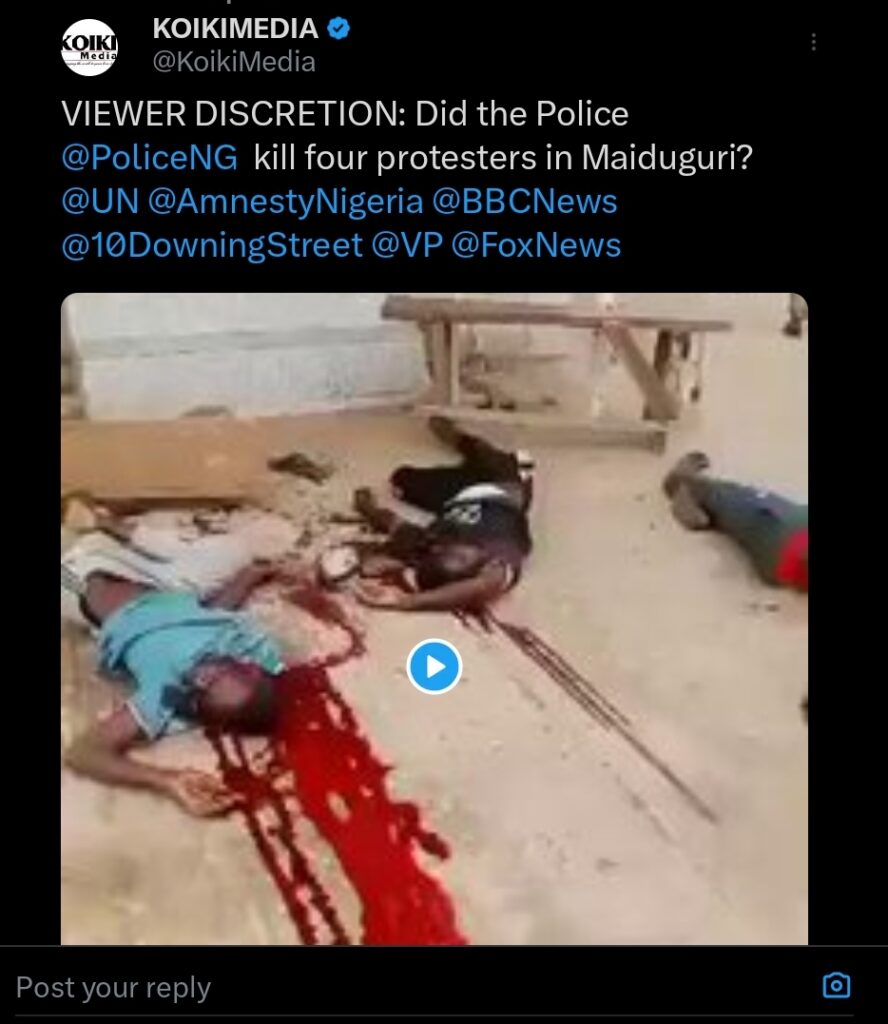
The Borno State Police Command could not be reached for comments, a 24-hours curfew was declared after the incident.
The peaceful protest against bad governance turned violent in Kaduna State, leaving no fewer than 3 youths dead and many other protesters injured.
An eyewitness said the number of protesters mostly youths and the unemployed, which had outnumbered the security operatives, marched from the Rigasa area and from the Abakwa end, towards the Sir Kashim Ibrahim House, the official residence and office of the state governor.
“We were matching peacefully and no one was carrying any offensive weapon,” the surviving protester who pleaded anonymity to local news outlet Vanguard News.
“I think the security operatives near the Government House were threatened by our large number.
“Suddenly, a vehicle, that they use in spraying hot water on protesters, came speeding towards us from the Government House axis and sprayed us with hot water, then another security vehicle came on speed from the 44 Reference Hospital end.
“In the confusion that ensued and as we scampered to save ourselves from being hit by the security vehicles, 3 peaceful protesters were hit and they died. No one carried any weapon, we were just carrying placards and chanted slogans against bad governance,” he said.
Meanwhile, report indicated that the office of the Kaduna State Traffic Agency ( KASTLEA) was touched by the protesters.
Major streets in Kaduna City, the capital of the northern state were deserted, markets and shops closed due to fear the protest might be hijacked by hoodlums.
Amid protest in the Yauri local government area of Kebbi state, a stray bullet allegedly fired by marine police near the Yauri river killed a businessman in his shop where he sells plastics.
One Malam Umar Bako Yelwa who confirmed the incident said that the protest became violent when protesters blocked the federal highway blocking traffic into Yauri town in the northern state.
He added that while marine police engaged the protesters to disperse them, they allegedly fired bullets and a stray bullet hit and killed the innocent plastic seller in his shop whose name could not be ascertained.
SP Nafiu Abubakar, spokesman for the state police command did not immediately return a request for comment.
In Calabar, Cross River State, police brutalised one of the organisers of the protest, identified as Jonathan, a Coordinator of Take It Back movement Cross River State, South-South region of the country.
There was pandemonium at the Biogbolo suburb of Yenagoa, the Bayelsa State capital during the hardship protest as a group of youths reportedly clashed with protesters along the Chief Melford Okilo Road.
It was gathered that the community youths are against the hunger protest in the South-South region of the country.
The end bad governance protesters who were accompanied by two police vans were allegedly attacked unexpectedly from behind with bottles, planks of wood and other weapons.
But the attack was swiftly repelled by a team of police officers monitoring the situation to ensure that there was no breakdown of law and order.
The aggrieved protesters said they were out to demand action from the government to end the high cost of living and hunger.
They chanted solidarity songs and carried placards with various inscriptions such as ‘Restore fuel subsidy and reduce the price of petroleum products now’, ‘We are dying of hunger in our own country’, ‘We are suffering so much now’ and ‘We can no longer feed our children’, among others.
The protesters marched through the Yenagoa-Mbiama Road and the Melford Okilo Road defying the morning showers to register their grievances.
However, there was another set of protesters led by the Secretary of the Bayelsa State Vigilante, Innocent Kalango, in solidarity with the state government.
“We came out in solidarity with the Bayelsa State government because of the massive infrastructural projects being done by the present administration. We are just developing in Bayelsa and we will not want to see the structures on ground destroyed,” Vanguard News quoted Kalango as saying.
Despite efforts by stakeholders in Taraba state to ensure residents did not participate in the nationwide hunger protest, some youths marched across major streets of Jalingo, the capital of the northern state.
Security operatives were stationed in various parts of the metropolis to prevent a breakdown of law and order.
The protesters carried placards with inscriptions highlighting widespread hunger across the country.
They called on the federal government to address the hunger crisis and some demanded the restoration of the subsidy on petrol.
Policemen tear-gassed defiant protesters at the Lekki Tollgate in Lagos on Thursday morning.
Protesters gathered at the Lekki Tollgate during the End Bad Governance protest. These protesters carried placards expressing their dissatisfaction with President Bola Tinubu’s administration.
Chanting solidarity songs, the protesters decried the hunger in the country and called for swift government action.
“We just want the country to be stable. People are hungry. People are dying. We are not coming to fight; we only want the government to do something,” a female protester said.
Numerous security agents, including policemen, soldiers, officers of the Nigeria Security and Civil Defence Corps (NSCDC), and the Lagos State Neighbourhood Safety Agency, were present at the iconic tollgate.
Police informed the mostly young demonstrators of a court order restricting their gathering to Gani Fawehinmi Park in Ojota and Peace Park in Ketu, both in Lagos mainland.
The youths who converged at the tollgate rejected the relocation to Lagos mainland and continued their demonstrations until they were dispersed by police teargas.
Protesters also stormed the Lagos State House of Assembly at Alausa Secretariat, Ikeja. Police’ efforts to drive the protesters away proved futile.
The armed police watched as protesters marched toward the government house and then proceeded to two locations that were authorised for the protest. Some shopping malls in the city were shut and guarded by a heavy police presence.
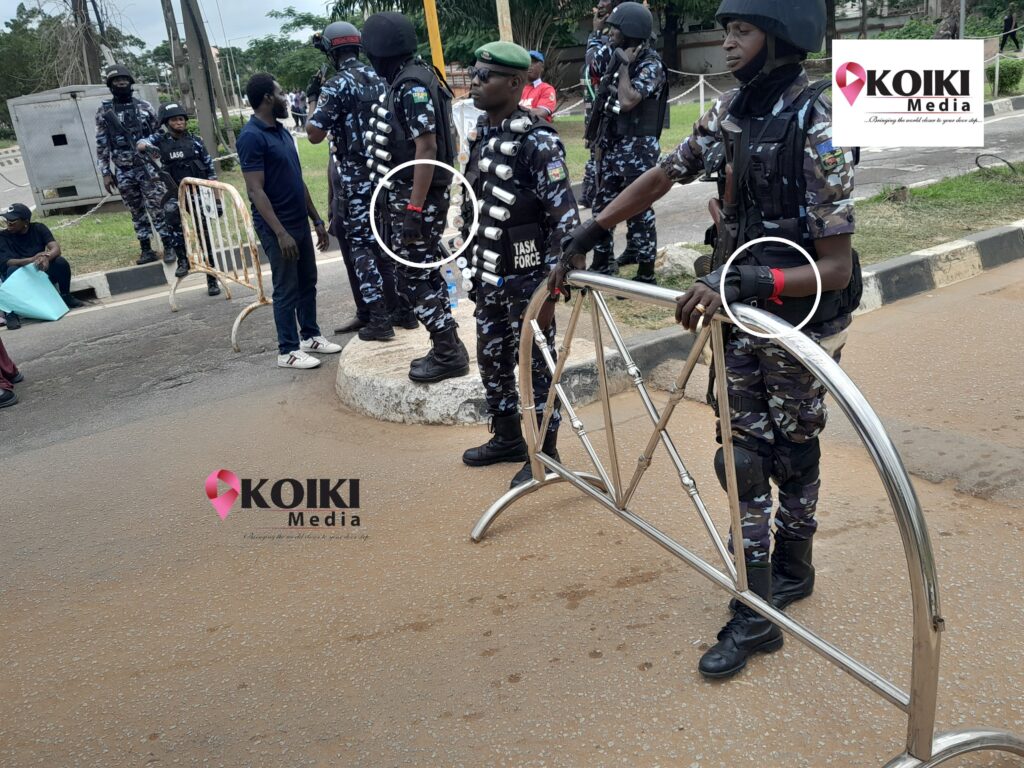
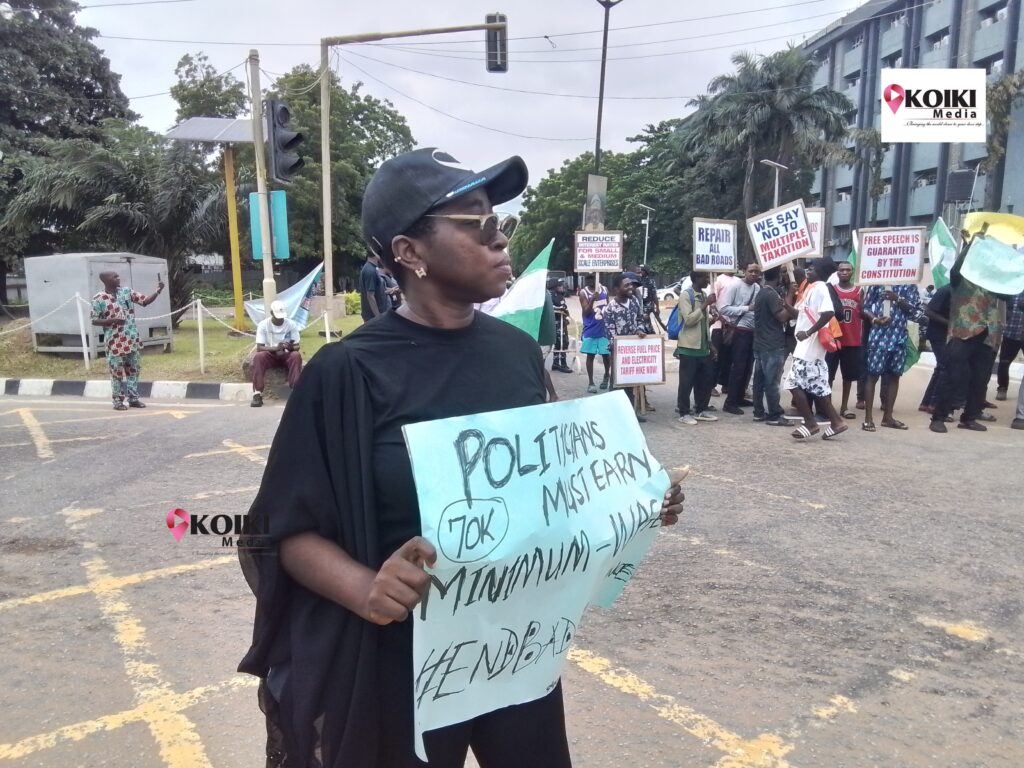
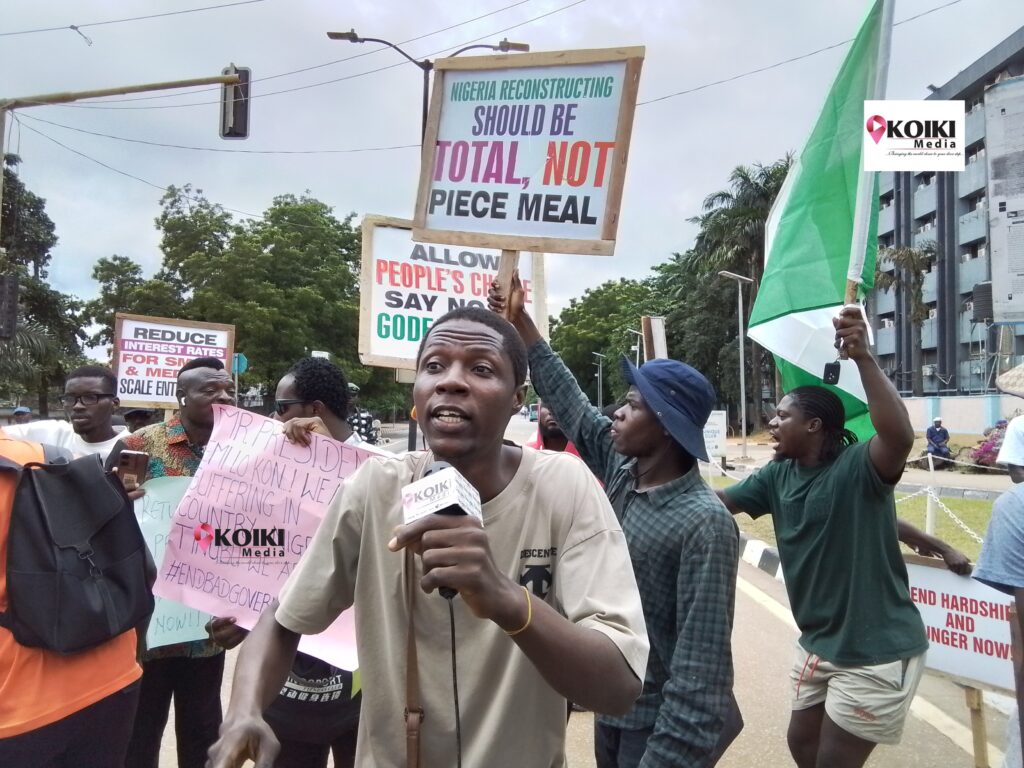
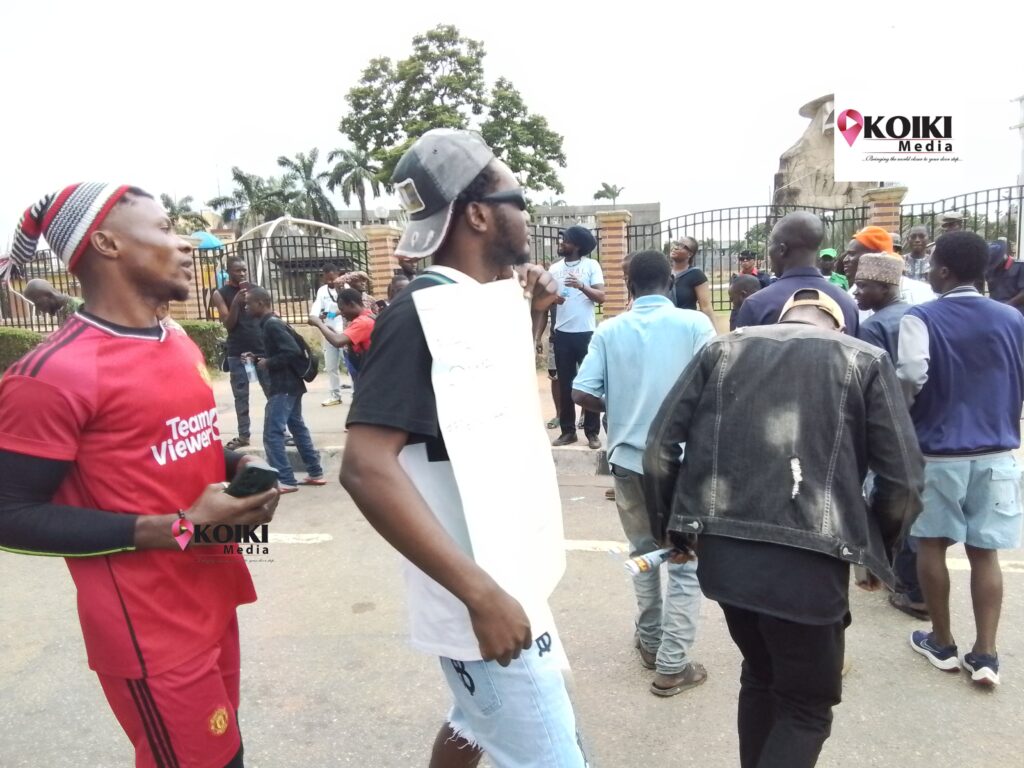
At Mokola Roundabout in Ibadan, Oyo State capital, citizens trooped out en masse to protest the prevailing hunger and abuse of power in the country.
The protest against hardship and hunger, which began on Thursday, August 1, took a violent turn when some individuals hijacked the demonstration, clashing with the Nigerian Army in the country’s capital Abuja.
Eyewitnesses reported that the protesters, who had gathered at the popular Nyanya bridge, were initially peaceful, expressing their concerns about the economic situation in the country.
However, the situation quickly escalated when a group of individuals began vandalizing public properties, including street lights, and throwing stones at the Nigerian Army, according to local news outlet, Vanguard News.
The army, deployed to maintain order, was met with resistance from the rioters.
The situation became chaotic, with many people running for cover.
The violent individuals were heard hollering: “Bamayi”, meaning: “We are no longer interested”.
It was not evident whether they were part of the original protest group or had infiltrated the demonstration with ulterior motives.
Protesters in Abuja shouted down the Minister of State for Youth Development, Ayodele Olawande, as he attempted to address them at Eagles Square, preventing him from speaking.
The crowd continued to chant “hunger dey”, meaning “there is hunger”, as the minister tried to make his voice heard.
However, after eventually calming the crowd, the minister assured the protesters that he was not there to shut down their demonstration, but rather to show solidarity as a ‘comrade’ who has attended numerous protests himself.
He estimated that he has participated in between 100 to 500 protests, emphasizing that he respects their right to protest.
The minister also promised to address the police regarding their use of teargas canisters against the protesters.
Despite his efforts to engage with the crowd, the protesters remain resolute in their demands and refused to relocate to the Moshood Abiola National Stadium, citing concerns about police interference.
Security personnel in Plateau State ensured that the protesters remain within the bounds of the peaceful exercise of their right to protest as they man strategic locations in the north-central state.
Some Muslims turned the protest ground into prayer grounds as their Christian counterparts created spaces for them to pray.
Police protected protesters in Bauchi State as concerned residents of the northern state flood the streets to protest hardship.
At early hours of Thursday, hundreds of protesters in Gusau the capital of Zamfara state, mostly young children of 15 to 20 years stormed Gusau Government House Seeking Government to provide food and end poverty in Nigeria.
Some protesters along Dallatu area of Gusau also blocked the main street linking to Sabuwar Kasuwa refusing motorists to pass by and calling for President Bola Ahmed Tinubu to return back fuel subsidy, and open boarders to allow food items to the country.
One of the protesters who gave his name as Abdullahi Dalibi, said they are protesting to depend their right and the right of their future.
According to him, the current leaders in the country are not depending the interest of the masses in the country but only know themselves and their relatives.
Two parallel groups, for and against Tinubu’s government staged their protest in Yola, the capital of Adamawa State, as security agents averted a clash by the two groups.
As the two groups marched in opposite routes, the situation got tensed, as they started infiltrating into each other leading to commotion and verbal abuse, according to Vanguard News.
The presence of heavily armed personnel prevented the situation from degenerating into a free for all fight.
No breach of peace has been recorded in Adamawa, even as the situation has created fear among the people.
At Ado-Ekiti, Ekiti State capital, residents were seen going about their usual daily activities while security personnel, made up of the anti-riot policemen and their regular counterparts, including a detachment of the soldiers, civil defense, immigration and Amotekun manned strategic locations, such as Ijigbo roundabout, Okesa roundabout, Irona roundabout, and Atikankan, to ensure law and order.
Popular markets in the state, including Oja Oba, Bisi Market, Okesa Market, and Agric Olope, were also bustling with transactions without any disruptions.
Speaking with a trader in Okesa Market, one Iyabo Ajayi acknowledged the citizens’ right to protest but added that protests cannot solve the pressing issues, especially in a country like Nigeria.
Opeyemi Iyunloye who opined that Ekiti did not join the protest due to the state governor’s address urged citizens to embrace peace while the federal government works to find a lasting solution to the issues.
Earlier, the governor of the state, Biodun Oyebanji, enjoined youths not to submit themselves to “evil merchants” who might turn the protest from a peaceful demonstration to anarchy.
Oyebanji, who made the call on Wednesday in his special state address, added that the protest might repeat the 2020 saga, from which the state and the country are still recovering.
He said the federal government is working on the yearnings of Nigerians, noting that efforts are being intensified to lessen hunger and end hardship.
All markets, stores and artisan’s shops in Nnewi the industrial town and Onitsha the commercial city of Anambra State, opened for business as traders and youths shun the #EndBadGovernance# nationwide protest that started today across the country.
One Igbo vocal group that made their opposition categorically clear to the protest is the United Igbo Elders Council, UNIEC, Worldwide, and their stand according to a statement they issued Thursday morning is “based essentially on the differential attitude to human rights that the organizers have shown towards the Igbo/East in particular, and other Nigerians as well.”
UNIEC, in the statement signed by its Director, Media and Publicity, Prof. Obasi lgwe and its Coordinator General, His Lordship Alpha Justice, said that “The loud silence, signalling acquiescence, of some of its organizers to the extremely targeted injustices against the Igbo/East and, for the last nine years, orchestrated killings, with countless evidences of official involvement or connivance, with no sympathy from anywhere, baffles imagination.
Residents of Imo State, another south-eastern state, refused to participate in the nationwide protest against hardship in the country.
At the Relief Market and Ekeukwu Owerri, few traders were seen displaying their wares.
A man who gave his name as Oliver Nnadi, told Vanguard News that they had their own protest at the polls during the presidential election.
“We did our own protest during the election in 2023. We saw this coming, and we voted for a better Nigeria. But some people said no.
“Why should we hit the streets now for protest? I’m not ready for that”, he stated.
Millions of Nigerians took to the streets on Thursday to protest the prevailing hunger and abuse of power in the country.
Those calling for the protests are demanding a reverse of some policies implemented by President Bola Tinubu believed to have engendered hardship in the country.
KOIKI Media correspondents report that banks in Mowe and Sango, Ogun state, and Ogba, Ikeja Lagos, shut operations due to the protests. Banks closed their operations in Osogbo, Osun state, and Ibadan, Oyo state too.
A busy computer market, popularly called computer village in Lagos’ capital Ikeja – also shut today.
Although banks did not publicly announce plans to shut operations, their security guards turned customers back.
President Bola Tinubu said his administration has been toiling to bring succour to millions of Nigerians now going days without food. The administration proposed a tariff cut for food imports last month but immediately shelved the plan, which further enraged citizens.
Security agencies had warned citizens to stay away from demonstration venues, a call that was widely rejected after being seen as a threat of the government’s sinister response to citizens’ frustration with the current dimension of the country.
Despite warnings from the police, military, and Department of State Services against Kenya-style protests, and politicians’ appeals for youths to cancel the planned rallies, the young people remain undeterred.
Recall that the military was making preparations in anticipation of a violent turn of activity in Lagos, according to a leaked memo.
The government also deployed other efforts to stymie the protests’ popular trajectory, hobbling internet speed in order to prevent protesters from widespread distribution of multimedia.
Nigeria is facing its worst economic crisis in decades, with skyrocketing inflation, a national currency in free-fall and millions of people struggling to buy food. Only two years ago Africa’s biggest economy, Nigeria is projected to drop to fourth place this year.
The pain is widespread. Unions strike to protest salaries of around $20 a month. People die in stampedes, desperate for free sacks of rice. Hospitals are overrun with women wracked by spasms from calcium deficiencies.
Although President Bola Tinubu increased the minimum wage — after strike action and months-long negotiations with labour unions — from N30,000 to N70,000, his government has increased spending for officials at a time of nationwide starvation.
For workers earning the new N70,000, or $43, per month minimum wage, capricious inflation and naira value have inflicted too much damage for the changes to make any difference in their lives.
The crisis is largely believed to be rooted in two major changes implemented by Mr Tinubu, elected 14 months ago: the partial removal of fuel subsidies and the floating of the currency, which together have caused major price rises.
A nation of entrepreneurs, Nigeria’s more than 200 million citizens are skilled at managing in tough circumstances, without the services states usually provide. They generate their own electricity and source their own water. They take up arms and defend their communities when the armed forces cannot. They negotiate with armed kidnappers when family members are abducted.
But right now, their resourcefulness is being stretched to the limit.
KOIKI Media bringing the world 🌎 closer to your door step
